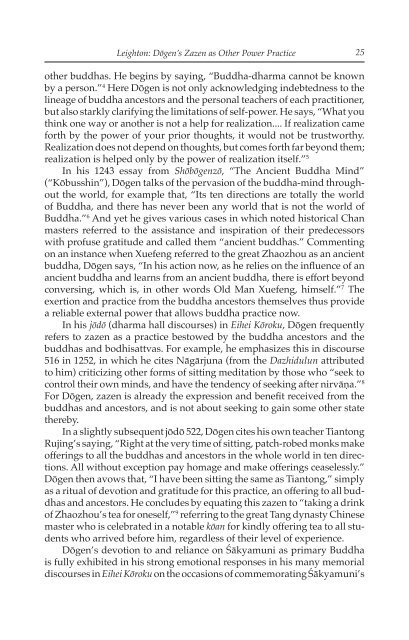PACIFIC WORLD - The Institute of Buddhist Studies
PACIFIC WORLD - The Institute of Buddhist Studies
PACIFIC WORLD - The Institute of Buddhist Studies
Create successful ePaper yourself
Turn your PDF publications into a flip-book with our unique Google optimized e-Paper software.
Leighton: Dōgen’s Zazen as Other Power Practice 25<br />
other buddhas. He begins by saying, “Buddha-dharma cannot be known<br />
by a person.” 4 Here Dōgen is not only acknowledging indebtedness to the<br />
lineage <strong>of</strong> buddha ancestors and the personal teachers <strong>of</strong> each practitioner,<br />
but also starkly clarifying the limitations <strong>of</strong> self-power. He says, “What you<br />
think one way or another is not a help for realization.... If realization came<br />
forth by the power <strong>of</strong> your prior thoughts, it would not be trustworthy.<br />
Realization does not depend on thoughts, but comes forth far beyond them;<br />
realization is helped only by the power <strong>of</strong> realization itself.” 5<br />
In his 1243 essay from Shōbōgenzō, “<strong>The</strong> Ancient Buddha Mind”<br />
(“Kōbusshin”), Dōgen talks <strong>of</strong> the pervasion <strong>of</strong> the buddha-mind throughout<br />
the world, for example that, “Its ten directions are totally the world<br />
<strong>of</strong> Buddha, and there has never been any world that is not the world <strong>of</strong><br />
Buddha.” 6 And yet he gives various cases in which noted historical Chan<br />
masters referred to the assistance and inspiration <strong>of</strong> their predecessors<br />
with pr<strong>of</strong>use gratitude and called them “ancient buddhas.” Commenting<br />
on an instance when Xuefeng referred to the great Zhaozhou as an ancient<br />
buddha, Dōgen says, “In his action now, as he relies on the influence <strong>of</strong> an<br />
ancient buddha and learns from an ancient buddha, there is effort beyond<br />
conversing, which is, in other words Old Man Xuefeng, himself.” 7 <strong>The</strong><br />
exertion and practice from the buddha ancestors themselves thus provide<br />
a reliable external power that allows buddha practice now.<br />
In his jōdō (dharma hall discourses) in Eihei Kōroku, Dōgen frequently<br />
refers to zazen as a practice bestowed by the buddha ancestors and the<br />
buddhas and bodhisattvas. For example, he emphasizes this in discourse<br />
516 in 1252, in which he cites Nāgārjuna (from the Dazhidulun attributed<br />
to him) criticizing other forms <strong>of</strong> sitting meditation by those who “seek to<br />
control their own minds, and have the tendency <strong>of</strong> seeking after nirvāṇa.” 8<br />
For Dōgen, zazen is already the expression and benefit received from the<br />
buddhas and ancestors, and is not about seeking to gain some other state<br />
thereby.<br />
In a slightly subsequent jōdō 522, Dōgen cites his own teacher Tiantong<br />
Rujing’s saying, “Right at the very time <strong>of</strong> sitting, patch-robed monks make<br />
<strong>of</strong>ferings to all the buddhas and ancestors in the whole world in ten directions.<br />
All without exception pay homage and make <strong>of</strong>ferings ceaselessly.”<br />
Dōgen then avows that, “I have been sitting the same as Tiantong,” simply<br />
as a ritual <strong>of</strong> devotion and gratitude for this practice, an <strong>of</strong>fering to all buddhas<br />
and ancestors. He concludes by equating this zazen to “taking a drink<br />
<strong>of</strong> Zhaozhou’s tea for oneself,” 9 referring to the great Tang dynasty Chinese<br />
master who is celebrated in a notable kōan for kindly <strong>of</strong>fering tea to all students<br />
who arrived before him, regardless <strong>of</strong> their level <strong>of</strong> experience.<br />
Dōgen’s devotion to and reliance on Śākyamuni as primary Buddha<br />
is fully exhibited in his strong emotional responses in his many memorial<br />
discourses in Eihei Kōroku on the occasions <strong>of</strong> commemorating Śākyamuni’s

















